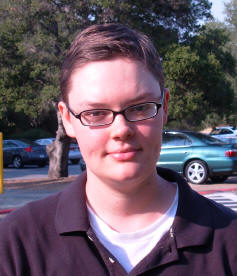
Handy Links
SLAC News Center
SLAC Today
- Subscribe
- Archives: Feb 2006-May 20, 2011
- Archives: May 23, 2011 and later
- Submit Feedback or Story Ideas
- About SLAC Today
SLAC News
Lab News
- Interactions
- Lightsources.org
- ILC NewsLine
- Int'l Science Grid This Week
- Fermilab Today
- Berkeley Lab News
- @brookhaven TODAY
- DOE Pulse
- CERN Courier
- DESY inForm
- US / LHC
SLAC Links
- Emergency
- Safety
- Policy Repository
- Site Entry Form

- Site Maps
- M & O Review
- Computing Status & Calendar
- SLAC Colloquium
- SLACspeak
- SLACspace
- SLAC Logo
- Café Menu
- Flea Market
- Web E-mail
- Marguerite Shuttle
- Discount Commuter Passes
-
Award Reporting Form
- SPIRES
- SciDoc
- Activity Groups
- Library
Stanford
Around the Bay
Elizabeth Mullin, 2008 Katherine Pope Fellow
 This year’s Katherine Pope fellow is Elizabeth Mullin, a physics student and rising junior at U.C. Riverside. She’s working with Owen Long to analyze data from the BaBar detector’s recordings of electron-positron collisions, looking for “rare and forbidden decays” of D-mesons, a class of intermediate-mass subatomic particles receptive to the strong interaction.
This year’s Katherine Pope fellow is Elizabeth Mullin, a physics student and rising junior at U.C. Riverside. She’s working with Owen Long to analyze data from the BaBar detector’s recordings of electron-positron collisions, looking for “rare and forbidden decays” of D-mesons, a class of intermediate-mass subatomic particles receptive to the strong interaction.
“When I first got here, it was kind of overwhelming,” said Mullin, adding that she did not know what to expect. However, her past few weeks, spent preparing computer programs to tackle the meat of her analysis, appeared to bode well; “Just being here, a big big place with a whole lot of physics people—it’s really really cool.”
Why particle physics? Mullin’s response is simple: “It’s fascinating.” Intrigued by the standard model’s weaknesses and its gamut of theoretical extensions—such as string theory, super-symmetry and other dimensions—Mullin gravitated towards the field after reading books on the subject. However, the seeds for this foray were planted even earlier: growing up as a child, Mullin recalled hearing her father, himself a former physics student, talk about physics and “complain about quantum mechanics.” Familiar with concepts such as tunneling by the time she started her undergraduate coursework, Mullin attributes her decision to pursue physics over engineering to her father’s influence. “I knew about quarks before I knew about atoms,” she said.
Though her first experience doing original research, this appointment is not her first time working with Long. Mullin first encountered Long, who divides his time between SLAC and teaching undergraduate coursework at U.C. Riverside, as her academic major advisor. After “bugging him” to share a project, the possibility emerged and Mullin continued to take classes with him and now, work with him directly.
In a happy incident, physics is both work and release for Mullin. Doing physics, or reading about it, comprise her free time fun activities, as does watching similarly-themed shows on TV. “It’s really funny and as far as I can tell, they get the physics right,” Mullin said of Big Bang Theory, also mentioning the show Numbers. Beside her deep-felt interest in science, Mullin stands out for her possession of hand-made armor, inspired by the Lord of the Rings trilogy. Using a pattern for the tunic and a contraption to wind wire into mail, Mullin explained, “I did it mostly to prove that I could do it.” It’s an attitude that appears to have served her well.
—Zoë Macintosh, SLAC Today, July 10, 2008